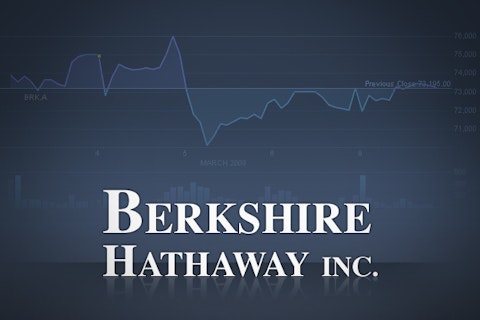Few people would accuse Warren Buffett of being hostile to shareholders of Berkshire Hathaway Inc. (NYSE:BRK.B). He’s open, forthright, and doesn’t pad his own pockets at the expense of investors. With a $100,000 salary and 21.4% stake in the largely financial conglomerate, Buffett does well when his shareholders do.
Yet, there’s one area where he comes up short. As Buffett acknowledged in his most recent letter to shareholders, “A number of Berkshire shareholders — including some of my good friends — would like Berkshire Hathaway Inc. (NYSE:BRK.B) to pay a cash dividend.”
For those of you that follow Berkshire — and, if you do, I urge you to check out our page dedicated to the company’s upcoming annual meeting by clicking here — it’ll come as no surprise that Buffett isn’t a stranger to dividends. By his own admission, he “relishes” the ones Berkshire receives from most of the stocks it owns. In 2012, its earnings included a staggering $1.1 billion in dividends from its “Big Four” investments alone: The Coca-Cola Company (NYSE:KO), Wells Fargo & Co (NYSE:WFC), International Business Machines Corp. (NYSE:IBM), andAmerican Express Company (NYSE:AXP).
Despite this, as my colleague Morgan Housel discussed at the beginning of March, Berkshire Hathaway Inc. (NYSE:BRK.B) has only paid a dividend once, and that was more than 40 years ago. “I must have been in the bathroom when the decision was made,” Buffett is often quoted as saying.

So that’s the end of that, right? Well, not so fast.
While there’s little question that Buffett is arguably the world’s best capital allocator, as I noted in an article about seven reasons to sell Berkshire, he’s not going to be around forever. And when he’s no longer in control of Berkshire Hathaway Inc. (NYSE:BRK.B), it seems unlikely that his replacement will be able to completely fill his shoes.
One of the things Buffett is known for is “deal flow.” When companies like Bank of America Corp (NYSE:BAC) or Goldman Sachs Group, Inc. (NYSE:GS) need a stamp of approval, as they both have over the last few years, they go to Buffett (and notably, not Berkshire) — though, to be fair, B of A’s CEO Brian Moynihan said that Buffett came to him.
And what does Berkshire get in return? Money, that’s what, and lots of it.
For its $5 billion investment in Goldman, which spanned a mere four and a half years, Berkshire Hathaway Inc. (NYSE:BRK.B) took home $3.2 billion in profit. And its equally sized $5 billion investment in B of A could end up being even more lucrative given the accompanying warrants to purchase 700 million shares of the bank for $7.14 a share. At today’s price, that equates to a profit of $3.7 billion; excluding the dividend payments Berkshire has and continues to receive on its preferred shares.
The point is that, while Berkshire Hathaway Inc. (NYSE:BRK.B) may very well carry on being great, there’s little reason to believe that it can be as great without Buffett as it has been with him. And it’s for this reason that Buffett’s anti-dividend policy may need to be updated while he’s still at the helm.
The article Why Warren Buffett Doesn’t Pay Dividends originally appeared on Fool.com.
John Maxfield owns shares of Bank of America. The Motley Fool recommends Berkshire Hathaway and Goldman Sachs. The Motley Fool owns shares of Bank of America and Berkshire Hathaway.
Copyright © 1995 – 2013 The Motley Fool, LLC. All rights reserved. The Motley Fool has a disclosure policy.




